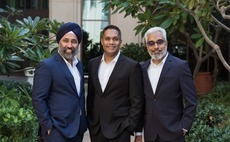
Asia Awards: Special Achievement – Lewis Rutherfurd
In AVCJ's 25th year, the Special Achievement Award – which recognizes an individual who has distinguished himself or herself over a long period of time in developing the industry – went to a man who can claim more credit than most for getting the publication of the ground in the first place.
Lewis Rutherfurd set up Inter-Asia Venture Management in 1972 so the firm was already established by the time AVCJ came along in 1987. However, the industry as a whole was still in its early growth phase, and it was decided that a trade journal might provide some momentum.
"We started AVCJ so that firms could raise money," Rutherfurd said when accepting his award. "The target was the LPs and we were hoping they would read it and be interested in what everyone was doing. There were barely 100 participants to start with but we know from the stats how successful the industry has become."
The initial idea was that Inter-Asia would work with US-based Venture Economics to create an Asia joint venture. The VC firm was willing to contribute capital and local management and, if the business launched successfully, exit its holding to Venture Economics after a few years.
The transfer investment model had already worked well for Inter-Asia in its first fund as McDonald's and Ikea launched in Hong Kong. Asia Renal Care and Australia's Cookie Man are more recent examples.
Venture Economics, however, was not interested. Rutherfurd reached out three other Asia-focused VCs for help - Victor Fung of Prudential Asia Investments, Ta-Lin Hsu of H&Q Asia Pacific, and Lip-Bu Tan of Walden International - and together they contributed about $1 million in start-up capital. They sold the title to Dan Schwartz in 1990.
Inter-Asia is now in the process of raising its fifth fund, which has a target size of up to $75 million, and remains focused on venture opportunities. Rutherfurd notes that, from the outset, there were several fundamental differences between the US and Asian VC models - "there wasn't much technology to invest in back then, it was better to have a larger stake, and you certainly couldn't leave the entrepreneur alone" - and some still hold true.
Inter-Asia is keen on the food and beverage, healthcare and education sectors, but steers clear of technology unless it working with a partner. Transfer deals are most effective when the brand owner is investing alongside the VC firm, and this is largely because the model relies on the transfer of expertise as well as brand name.
For example, Inter-Asia set up catering company Asia Foods with Compass Group, a global specialist in the field. "Institutional catering is quite high-tech and we wouldn't have done it without someone like Compass to bring us the technology and best practices," says Rutherfurd.
Latest News
Asian GPs slow implementation of ESG policies - survey
Asia-based private equity firms are assigning more dedicated resources to environment, social, and governance (ESG) programmes, but policy changes have slowed in the past 12 months, in part due to concerns raised internally and by LPs, according to a...
Singapore fintech start-up LXA gets $10m seed round
New Enterprise Associates (NEA) has led a USD 10m seed round for Singapore’s LXA, a financial technology start-up launched by a former Asia senior executive at The Blackstone Group.
India's InCred announces $60m round, claims unicorn status
Indian non-bank lender InCred Financial Services said it has received INR 5bn (USD 60m) at a valuation of at least USD 1bn from unnamed investors including “a global private equity fund.”
Insight leads $50m round for Australia's Roller
Insight Partners has led a USD 50m round for Australia’s Roller, a venue management software provider specializing in family fun parks.






